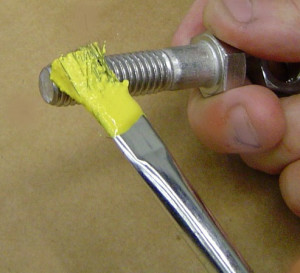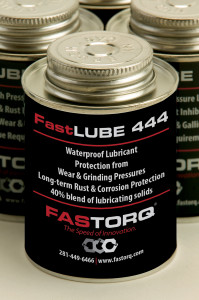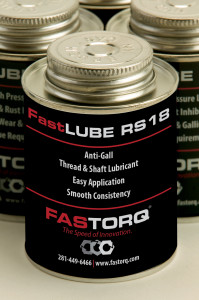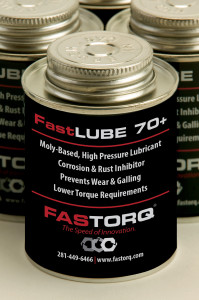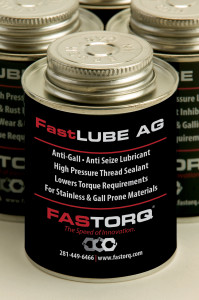An Easy Preventative Against Catastrophic Bolt Failure
A dry bolt can be a dangerous bolt.
This statement may seem a bit dramatic, but the plain truth is that using the proper lubricant on your threaded fasteners is more important than you may realize, especially if you work in an industry where bolt problems can significantly impact production and profitability.
Bolt failure, loose bolts, leaking joints, damaged gaskets and uneven flange alignment are the result of improper bolt preload. Even one poorly assembled critical joint in a refinery, nuclear plant or paper mill can cause a costly shutdown or even the loss of human life.
Lubricants help control one of the factors, that get in the way of achieving proper bolt load from applied torque. They assist with smooth bolt make-up, lower the torque needed for make-up and help reduce galling during break-out.
However, a one size fits all approach to lubricants is just as dangerous as using no lubricant at all. It’s imperative you not only understand the benefits of using a lubricant but also spend the time to find the right lubricant for the conditions your bolt will encounter.
Lubricant Benefits
- Controls Friction. Friction during torque can cause galling, seizing and fastener wear. A properly selected lubricant will prevent these problems from occurring by reducing the overall amount of friction in the bolt assembly process.
- Assists with Proper Tension. Even when following prescribed torque, unexpected nut factors can severely reduce the expected fastener preload. Underloading is not uncommon. By understanding these unexpected nut factors and selecting a lubricant that will help overcome at least one of them, you will be much closer to achieving your desired preload.
- Reduces Corrosion. The elements can wreak havoc on your fasteners. With the right protective lubricant, you can reduce and even prevent corrosion from moisture and chemicals thanks to the barrier it provides.
- Aids Break-out. It’s been shown that a bolt assembled with a lubricant containing a high amount of solids is easier to break-out, even years later. This is due to lubricant residue remaining after fastener make-up. By taking a proactive approach to bolt loosening and using a lubricant during initial tightening, you can avoid galling associated with bolt break-out.
- Reduces Damage. When a bolt fails in a critical joint, it never has a good outcome. Loss of production, hazardous emissions, financial damage, dangerous material leaks and worker injury or death may result. These tragic events can be reduced or even eliminated by adding the proper lubricant to your bolting procedure since it helps a bolt in make-up preload.
Finding the Right Lubricant
Lubricants are compounds that reduce friction between moving surfaces. Yet, not all lubricants are right for your bolting application. Oil is considered a lubricant but will squeeze out under pressure and can leave the contact area dry.
It’s important to find a thread lubricant with a higher percentage of high pressure grease and solids since they leave a mechanical barrier in place. Even when the liquid portion of the lubricant evaporates, the solid materials will remain and assist with bolt release.
To find the right lubricant for your application, it is important to remember the following:
- Environmental conditions play a significant role in how a lubricant works. Extreme temperatures, salt water, humidity, and many other conditions should be considered when finding the right lubricant for your job.
- A lubricant’s chemistry must be compatible with your fastener’s material to avoid damage from the lubricant. Otherwise, fasteners can corrode or break down faster than anticipated.
- Your lubricant must meet the standards required by your industry. Safe food production, wildlife preservation and extreme heat are just some of the standards should be taken into account when choosing a lubricant.
- The speed at which the moving surfaces move relative to one another can make a difference in which lubricant you should choose. Threaded connections are an example of slow moving surfaces and require lubricants that are properly formulated for these slow moving, high pressure applications.
- A lubricant with a low friction factor will result in greater bolt preload.
- Lubricants with a high friction factor will cause decreased bolt preload.
- As added insurance, a direct tension indicator is also recommended to guarantee proper bolt tension.
Ultimately, not all lubricants are created equal. Finding the right one will not only reduce friction, increase bolt preload accuracy and make bolting easier to perform but save you and your company from the damages associated with catastrophic bolt failure.
When looking for a great thread lubricant, look no further than FASTORQ’s FastLUBE Bolting Lubricants. They contain a high percentage of solids, ranging from 50 to 72 percent, and are formulated to be smooth and slippery under pressure.
The FASTORQ Line of Bolting Lubricants
- FastLUBE AG stops galling and is a great sealant.
- FastLUBE RS18 has a strong polar attraction, prevents galling and provides smooth application.
- FastLUBE 70+ is perfect for high-pressure threading and turns make-up and breakup-out into a breeze.
- FastLUBE 444 provides waterproof protection and is ideal for use with open gears.
Share
AUG
2013

